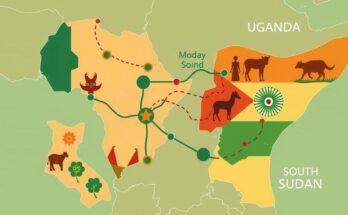Rwanda-backed rebels have declared a unilateral ceasefire in Goma while retaining control of the city. At least 900 people died in recent conflicts, and the rebels advanced towards Bukavu. The M23 group’s motives include protecting civilians amidst ongoing ethnic tensions in the region, enriched with mineral resources. Families suffer tragic losses, seeking identification of deceased loved ones as hope for peace remains uncertain.
Rwanda-backed rebels have declared a unilateral ceasefire in Goma, eastern Congo, while still maintaining control of the city. The ceasefire, announced for humanitarian reasons, follows intense fighting that resulted in at least 900 deaths. The rebels, part of the M23 group, emphasized their intention to protect civilians, despite their advance towards Bukavu and aspirations to reach Kinshasa. Meanwhile, the Congolese government has not responded to the ceasefire call, as regional leaders are set to meet for discussions on the situation.
The M23 rebels currently possess around 4,000 troops from Rwanda, a significant increase since their previous brief capture of Goma in 2012. They are one of over 100 armed factions in eastern Congo, a region rich in valuable minerals. Recent clashes prompted further displacements, with many people fleeing to neighboring Rwanda amidst claims of ethnic persecution involving the Tutsi and Hutu populations. The conflict traces back decades, tied closely to historical ethnic strife in the region.
The recent violence has left families mourning their lost loved ones, with individuals sprinting to morgues in search of bodies. Reports from Goma reveal tragic stories of civilians affected by the clashes, highlighting the grim human toll of the conflict. Amidst fears and chaos, many are left grappling with the devastation of ongoing hostilities that have uprooted their lives and communities.
The conflict in eastern Congo has deep roots tracing back decades and is heavily intertwined with historical ethnic tensions between Hutus and Tutsis. M23, the rebel group involved in the recent violence, claims to protect Tutsi populations against Hutu-led militias. Rwanda’s alleged involvement supports M23, citing concerns over the persecution of Tutsis in Congo, relating back to the 1994 Rwandan genocide. The region’s mineral wealth adds another layer of complexity, as various armed factions vie for control and economic gain amidst the chaos.
In conclusion, the declaration of a ceasefire by Rwanda-backed M23 rebels does not signal an end to their influence in Goma, where humanitarian crises persist. The situation remains dire as fighting continues, displacing thousands and highlighting longstanding ethnic tensions. With regional leaders poised for discussions, the hope for a sustainable resolution appears tenuous, amidst the backdrop of historical grievances and a quest for control over valuable resources.
Original Source: www.pbs.org




